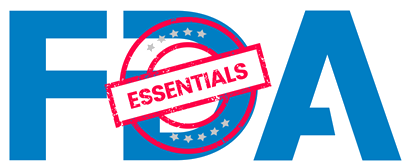Menu
FDA Inspection / Warning Letter

Warning Letters
In a Warning Letter, FDA claims publicly that a firm has violated the law, to get the firm to voluntarily comply with the rules. W…
Warning Letters
In a Warning Letter, FDA claims publicly that a firm has violated the law, to get the firm to voluntarily comply with the rules. When a company isn’t successful in resolving FDA’s claims by properly responding to the Warning Letter, more significant consequences can occur. We can help you expertly respond to FDA and close out the Warning Letter as quickly and competently as possible.
- Close-out the Warning Letter ASAP with our expertly-written responses.
- Keep your products in the market with professional assistance today.
- Our honest and reasonable flat-fees keep you from wasting money.
FDA Warning Letters are only issued for violations of “regulatory significance” – defined as violations that are likely to lead to an enforcement action if the recipient does not quickly and adequately correct the violations. In other words, FDA expects companies to fix their violations or face stronger, formal enforcement action, such as recalls, seizures, injunctions, and civil penalties.
FDA often issues Warning Letters after a very poor facility inspection. However, Warning Letters also result from illegal promotional activities on websites and in advertising.
Warning Letter – A public official warning that documents the FDA’s allegations that your operations and/or products violate the law. FDA typically gives a company 15 days to respond to the warning letter.
Adulterated – The product violates FDA law by being unsafe, unsanitary, contaminated, filthy, or otherwise improperly made.
Misbranded – The label or labeling violates FDA law because it has false or misleading statements, or otherwise lacks required label or labeling statements. Read More

Inspections & 483s
The U.S. FDA is allowed to inspect facilities and examine products & records. During this process, the FDA inspector is not you…
Inspections & 483s
The U.S. FDA is allowed to inspect facilities and examine products & records. During this process, the FDA inspector is not your friend and FDA is not present to help you comply. We can help you during the inspection process and to respond to any claims FDA makes on its Form 483.
- Rest easy before, during, and after your inspection knowing you have our experienced team behind you.
- Minimize disruptions with prompt and professionally drafted responses.
- Save money with stress-free flat-fee pricing
- Improve your reputation with FDA without getting bullied
During an FDA inspection, FDA will review all your processes, paperwork, and labels. At the end of the inspection, FDA will issue their report. Their report will invariably contain a Form 483 listing the violations (“observations”) that they discovered in the inspection. If the violations are significant, FDA may issue a public Warning Letter
FDA Form 482 – The written and signed notice the FDA gives you at the start of the inspection.
FDA Form 483 (“Inspectional Observations”) – The form the investigator gives you that lists all the problems they allege about your operation. You must respond to the 483 with remedial actions.
FDA Form 484 (“Receipt for Samples”) – A form the FDA issues to you when they take samples off the premises.
Affidavit – The document that the FDA will try to get you to sign and admit to violations. Do not sign this without an attorney review.
EIR (Establishment Inspection Report) – The investigator’s report.
Warning Letter – A public official warning that documents the FDA’s allegations that your operations and/or products violate the law.
Adulterated – The product violates FDA law by being unsafe, unsanitary, contaminated, filthy, or otherwise improperly made.
Misbranded – The label or labeling violates FDA law because it has false or misleading statements, or otherwise lacks required label or labeling statements. Read More

It Has Come To Our Attention (IHCTOA)
FDA issues “It Has Come to Our Attention” (IHCTOA) Letters to medical device companies promoting devices in a…
It Has Come To Our Attention (IHCTOA)
FDA issues “It Has Come to Our Attention” (IHCTOA) Letters to medical device companies promoting devices in a way FDA believes may object to. IHCTOA Letters are one way FDA attempts to learn about a potential regulatory problem. While these letters are not published, it is critical to promptly and carefully respond to FDA.
We will help you relax and then respond effectively to FDA’s IHCTOA letters, ensuring compliance with regulations and mitigating potential risks to your medical device business.
- Save your investment in your device and marketing with our expert assistance
- Provide the right amount of information to FDA
- Get transparent flat-fees to save money
- Avoid worry by allowing our experts to strategically address FDA’s concerns.
FDA’s Center for Devices and Radiological Health (CDRH) issues “It Has Come to Our Attention” Letters (IHCTOA Letters) to medical device companies regarding potential violations. In some case, FDA’s Center for Tobacco (CTP) and Center for Biologics (CBER) also use this letter. But most of them are issued by CDRH.
IHCTOA Letters do not necessarily mean that FDA is considering enforcement action. Rather, these IHCTOA Letters are the FDA’s attempt to learn more about a product and to give the company a chance to provide more information or to engage in corrective measures.
Most FDA IHCTOA Letters provide 30-days to respond. These letters are not published but can be obtained through Freedom of Information (FOIA) requests.
It is imperative to quickly respond to IHCTOA Letters to avoid FDA enforcement on the issue and protect your reputation with the government and the public. To do this effectively, you need to know not only the law, policy, and regulations, but also your rights and the limits of FDA power.
IHCTOA Letter – A letter from the FDA to gather additional information on a medical device (sometimes a tobacco or biologics product) and to provide the member of a regulated industry an opportunity to provide additional information and take corrective action.
Medical device – An instrument, machine, implant, in vitro reagent, or other similar or related article which is intended to diagnose, treat, or prevent disease or is intended to affect the structure or function of the body.
Center for Devices and Radiological Health —The branch of the FDA responsible for regulating medical devices and radiation-emitting products.
Biologic – medications made from proteins, blood, viruses, or living organisms (e.g., vaccines).
Read More

Untitled Letters
Untitled Letters are like Warning Letters, listing alleged violations that FDA wants companies to fix. Except Untitled Letters deal with…
Untitled Letters
Untitled Letters are like Warning Letters, listing alleged violations that FDA wants companies to fix. Except Untitled Letters deal with less serious violations and FDA allows for longer response times. Still, the most important factor in resolving an Untitled Letter is to respond decisively and expertly to FDA’s claims.
We can help you respond decisively and expertly to FDA Untitled Letters, resolving alleged violations, ensuring compliance, and protecting your image.
- Get experienced help to resolve the conflict with FDA
- Let us respond to FDA so you can get back to what you do best
- Our flat-fee prices covers the whole process
- Don’t let an Untitled Letter stress you out: let us step in to get FDA off your back.
When the FDA finds violations of the law and regulations, they may issue Untitled Letters informing you and requesting that you “voluntarily” correct those violations. These violations are often allegations of adulteration and misbranding against your products based on an inspection. An adulteration allegation typically points to failures in safe and sanitary production. Misbranding charges involve mistaken or misleading labeling and advertising.
An Untitled Letter is similar to the more common FDA “Warning Letter” in that they both point to alleged violations. The difference is that Untitled Letters are issued for less serious violations and do not include a warning of enforcement action for failure to comply, as you would find in a Warning Letter.
These letters request a written response within a reasonable time explaining how the company will rectify the alleged violations. In some cases, a response will include our team educating FDA on how the company is not in violation – because FDA is not always right.
Unlike Warning Letters, FDA does not publish most Untitled Letters. FDA typically only publishes Untitled Letters on the FDA website when the Agency deems it necessary to protect the public, deter future violations, or to ease FDA’s Freedom of Information obligations. While there is no fixed period for its issuance, FDA “strives” to issue Untitled Letter within six months from the last day of inspection, sample analysis, or of evidence collection.
To quickly resolve an Untitled Letter, you must respond decisively and expertly to FDA’s claims. Delay can lead to escalation by FDA.
Untitled Letter – A private citation of violations with a request for correction and a written response within a reasonable time—typically 30 days
Adulterated – The product violates FDA law by being unsafe, unsanitary, contaminated, filthy, or otherwise improperly made.
Misbranded – The label or labeling violates FDA law because it has false or misleading statements, or otherwise lacks required label or labeling statements.
Enforcement action – Actions that the FDA may take when a cosmetic is adulterated, misbranded or for other FDCA violations. These include civil seizure, criminal charges, mandatory recall of products, access to records, and suspension of facility registration.
Read More
